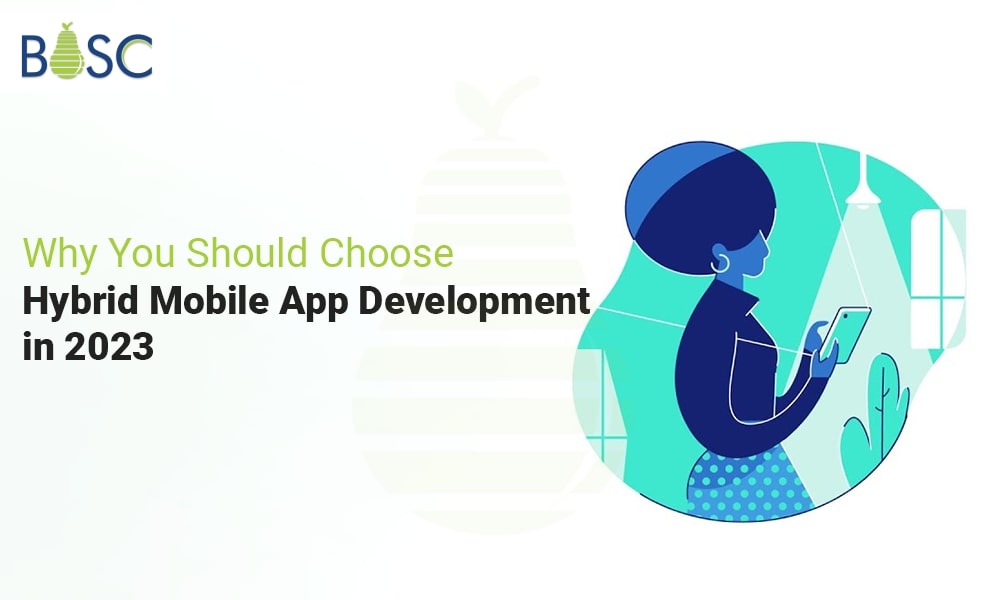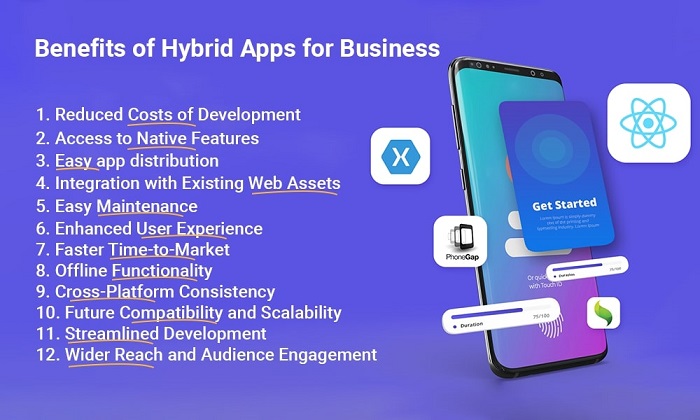Mobile applications development are becoming a vital tool for businesses to interact with their clients and improve the entire brand experience in the fast-paced digital world of today. There are several methods to take into account when it comes to app development, including hybrid, web, and native apps. This post will examine the benefits of hybrid mobile apps for your organization in 2023.
Hybrid App: Introduction
Let’s first examine what a hybrid app looks like.A mobile application created with web development software.
An iOS or Android app that was created using the same technologies as a website is known as a hybrid app. Basically, native apps like iOS and Android cameras and GPS are developed using languages like Swift and Java.However, when creating hybrid apps, technologies like HTML5, CSS3, JavaScript, etc. are used.
In addition, it depends on WebView, a feature of the OS that is standard, rather than a browser, as many web apps use. It is a “hybrid” since the content is read from the device’s mechanics web and it runs in the native environment.
Compared to PWA, the display route is different.
Both web applications that run online and native programs that run on the device are available for iOS and Android. PWAs, a subset of these web applications, have grown in popularity recently due to the rise in the number of applications that use them.
The term “progressive web apps” (PWA) refers to a type of software that has both native and web applications. Although it functions similarly to a hybrid app, its appearance is different. The PWA will be seen in the browser because it functions like a native app on the desktop or laptop.
A hybrid app has the attribute of being presented on the terminal by using the web’s mechanisms.
How are hybrid apps working?
If you want hybrid apps to function, WebView is essential. A feature of the OS for smartphones like iOS and Android is WebView. The main purpose of it is to integrate browser capabilities into native applications. As a result, you can include a function to display a web page in your program without developing or implementing it if you use WebView.
Simply by adding code to use WebView during application development, it is possible to display a web page in an application. This WebView is used with the framework and in conjunction with it. The most common app development frameworks are Cordova-like ones.
These frameworks include all of the components and functionalities required to create hybrid applications.
Which Alternative Is Better: Native or Hybrid Apps?
One of the most important factors to take into consideration while developing a mobile app is selecting the best technology. Native apps and hybrid apps are two often-used solutions. Don’t worry if you’re not familiar with these words; here is how the two categories of mobile applications differ from one another.
Native Apps: Also referred to as official development apps, native apps are created exclusively for popular mobile operating systems like Android or iOS. These programs go through two different development procedures because they are developed separately for each operating system. Although the layout, features, and user interface may be the same, native apps need to be programmed differently for each technology.
Kotlin or Java are the preferred programming languages for Android, while Swift or Objective-C are preferred for iOS.
Hybrid applications: In contrast to native applications, hybrid apps (also known as multi-platform or cross-platform apps) are compatible with both Android and iOS and may be produced using the same source code and a single coder. There are numerous frameworks or tools available for creating hybrid apps, each with unique features and methods for developing an app that appears and functions like a native one.
It’s crucial to remember that both native and hybrid apps have advantages and cater to various business requirements. Since they are tailored to various business settings, it is difficult to determine which is superior to the other. However, hybrid applications continue to be a popular option for businesses looking for quick and effective app solutions.
Hybrid app development has additional benefits that are just waiting to be realized. What are you still holding out for? Let’s continue our investigation into the area of hybrid Android or iOS app development.
Let’s now examine below why hybrid apps may be a wise decision for your business in 2023.
Advantages of Hybrid Apps for Business
1. Reduced Costs of Development:
It frequently takes different development environments, knowledge, and resources to create native apps for both the iOS and Android platforms. Contrarily, hybrid apps can be created utilizing well-known web technologies, considerably lowering the education and personnel expenses involved in their development. Businesses simply need to create one app, lowering development costs in half because hybrid apps can function on both iOS and Android.
2. Access to Native Features:
In contrast to web apps, hybrid apps have access to native features, including the location sensor, camera, and GPS. This implies that businesses may make the most of mobile devices’ full potential and offer customers a better, more engaging user experience. Hybrid apps can provide capabilities that closely mimic those of native apps without sacrificing cross-platform compatibility by combining native functionality. As a result, there are countless opportunities for mobile app developers to make robust, feature-rich apps that work flawlessly across several platforms.
3. Easy app distribution:
Hybrid apps can be released through a variety of app stores, making it simple for companies to connect with their target market. To make their programs available to a variety of people, they can make use of platforms like the Google Play Store and the Apple App Store. Additionally, available through web channels, hybrid apps can expand their reach and awareness.
4. Integration with Existing Web Assets:
If your company currently has a website, hybrid apps can interface with those assets without any issues. By integrating these systems, businesses can take advantage of their current online infrastructure and data while providing a uniform user experience across all platforms.
5. Easy Maintenance:
Keeping native apps updated and compatible with different OS versions can be difficult and time-consuming. However, because hybrid programs rely on web-based methods, they are less impacted by OS upgrades. Changes can be made on the server side while updating a hybrid app, simplifying and streamlining maintenance.
6. Enhanced User Experience:
By utilizing the inherent functionality of the device, hybrid apps can offer a seamless and immersive user experience. To give users interactive and tailored experiences, they can use hardware features on the smartphone, including the camera, accelerometer, and geolocation. The improved user experience helps to increase client happiness and engagement.
7. Faster Time-to-Market:
When compared to creating separate native apps for several platforms, hybrid mobile app development enables organizations to speed up their time-to-market. Businesses may release their app faster, reach their target audience quickly, and obtain a competitive edge with a single codebase that can be utilized across platforms.
8. Offline Functionality:
Hybrid apps may have offline capability that enables users to access particular features and information even without an internet connection. Hybrid apps can offer uninterrupted user experiences by caching data and using local storage, which is especially useful when traveling or in locations with weak network connectivity.
9. Cross-Platform Consistency:
The ability of hybrid apps to retain consistency across various platforms is one of their fundamental advantages. Regardless of the device or operating system, businesses can make sure that their brand identification, design, and functionality remain consistent. Users benefit from a seamless experience and a strong brand presence because of this consistency.
10. Future Compatibility and Scalability:
Hybrid app development frameworks provide scalability, enabling organizations to scale their apps as their user bases and requirements grow. Hybrid apps also minimize the need for extensive rework or redevelopment by being built to adapt to future technological developments and operating system updates.
11. Streamlined Development:
For enterprises with previous web app development experience, hybrid apps are a great option. Hybrid apps eliminate the need to learn new technologies or programming languages. The HTML5, CSS3, and JavaScript expertise of the app developers can be utilized to build mobile applications. Utilizing a single codebase also enables businesses to reduce development time and costs, accelerating time-to-market.
12. Wider Reach and Audience Engagement:
By choosing hybrid app development, businesses may launch their apps across several platforms and engage a larger audience. Hybrid apps enable cross-platform compatibility, whether they are for iOS or Android, ensuring that users of various devices may access and use the app without any issues. This broader reach translates into higher audience engagement and possible business growth.
Given these benefits, it is obvious that hybrid mobile apps may be a wise decision for companies in 2023. They provide access to native device functions and offer a cost-effective option by making use of already-existing web development expertise. Businesses may concentrate on providing a high-quality user experience and effectively engaging with their clients by using streamlined development and simple upkeep.
Working with a reputable mobile app development company is essential if you want to take advantage of hybrid app development’s advantages. These organizations can assist enterprises across the whole development lifecycle and are experts in hybrid app development frameworks like Ionic, React Native, or Flutter. They also specialize in app development.
Conclusion
Mobile applications are now a crucial tool for businesses to interact with clients and improve the brand experience in the modern digital world. Hybrid mobile apps will be a great alternative for organizations in 2023 when evaluating app development possibilities. But working with a reputable app development company is essential if you want to take full advantage of hybrid app development. These businesses concentrate on creating apps and are skilled in working with hybrid app development frameworks like Ionic, React Native, or Flutter. Businesses may benefit from hybrid apps, provide top-notch user experiences, and effectively interact with their customers in 2023 and beyond by working with a dependable partner.
Get in touch with Bosc Tech Labs, a top app development company that specializes in producing cutting-edge and effective mobile applications, to learn more about the advantages of hybrid app development for your organization. Connect with the professionals in mobile application development right now to take the first step toward maximizing the potential of hybrid apps for your company’s growth.
Frequently Asked Questions (FAQs)
1. What makes hybrid apps the future?
The testing load is lessened by hybrid apps, which enable code reuse. Since hybrid apps are developed from a single codebase, there is a reduction in the QA (quality assurance) process due to the minimal infrastructure required to test the mobile app. Hybrid apps can significantly enhance UX and UI.
2. Are hybrid apps quicker than web apps?
Speed. Sometimes mobile web apps are slower and less responsive than native apps. Although the functionality of the app mostly depends on the user’s internet connectivity, hybrid apps may provide faster performance.
3. Describe the hybrid mobile app.
Hybrid apps, which function on iOS and Android, combine features of native apps as well as web apps. They have cross-platform features because they were created using front-end developer languages like HTML5, CSS, and JavaScript. Given that they only need a single codebase, hybrid apps are both cost-effective and easy to maintain.
4. What distinguishes a hybrid app from a web app?
Any device, regardless of operating system, can use hybrid ones. App stores allow for the distribution and installation of both native and hybrid software on devices. Contrarily, web apps are browser-based and cannot be downloaded or installed on devices.





